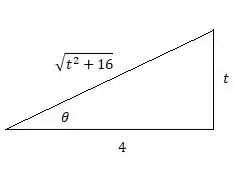Calcule a integral indefinida:
Passo 1
Para resolver essa integral vamos fazer uma substituição trigonométrica, temos que a expressão é da forma , nesse formato de expressão vamos fazer e utilizar a identidade trigonométrica :
Substituindo temos:
Agora usando a identidade trigonométrica:
Vamos fazer algumas manipulações aqui para usar a identidade novamente:
Passo 2
Para calcular essas integrais vamos usar substituição, na primeira vamos ter:
Aplicando vamos ter:
Agora é fácil achar as primitivas da função, usando uma expressão da Tabela de Integrais Indefinidas:
Aplicando:
Passo 3
Na segunda vamos usar:
Aplicando vamos ter:
Agora é fácil achar as primitivas da função, usando uma expressão da Tabela de Integrais Indefinidas:
Aplicando:
Passo 4
E por último, na terceira vamos ter:
Aplicando vamos ter:
Agora é fácil achar as primitivas da função, usando uma expressão da Tabela de Integrais Indefinidas:
Aplicando:
Passo 5
Agora é só juntar tudo:
Calma, não terminou ainda, vamos ter que voltar para a variável original :
Temos que , ou seja, , assim vamos usar o triângulo retângulo abaixo para achar :

Assim o valor de é:
Pronto, ficamos então com: